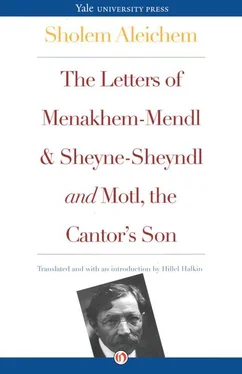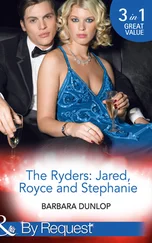Yoyneh the bagel maker hasn’t arrived yet. Neither have Pesye and her gang. They’re still roaming around Germany. “A hellhole,” the emigrants call Germany. They tell one horror story after another. Our stolen linen is chicken feed compared to what some people have lost there.
In Antwerp we’ve met a woman from Mezhbezh. She’s alone with her two children because her husband is already in America. She was on the road for a year, traveling all over and fighting with every Committee on the way. And now that she’s made it with her last ounce of strength, she isn’t being allowed aboard ship.
Bad eyes? Not at all! Her eyes are fine. She’s just a little touched in the head. I mean she’s perfectly normal except for the things she says now and then that could make you die laughing. Ask her, for instance, “Where is your husband?” and you’ll get the answer, “In America.” “And what is he doing there?” “He’s the emperor.” “But how can a Jew be an emperor?” “In America,” says the woman from Mezhbezh, “all things are possible.” You get the idea. And she has another strange notion too. She won’t eat and doesn’t want us to. We mustn’t touch the dairy products, she says, because in Antwerp they all have meat in them. “What about the meat?” asked my mother. “You call that meat?” says the woman. “Why, you can eat it with dairy!” We all roared except for my mother. She never laughs when she can cry. “Shame on you,” she said, wiping her eyes.
“Well, well, it’s about time! You haven’t cried for a whole day! How will they ever send us back to Russia if you don’t cry your eyes out?”
That’s my brother Elye. My mother’s eyes were dry in a minute. She feels sorrier for that woman’s children than she does for the woman herself. Don’t ask me why. As far as I can see, they’re having a grand time. They laugh as hard as we do at the crazy things their mother says. By now I know them pretty well. They say she doesn’t want to go back to Russia. She wants to join their father the emperor. (Ha-ha-ha!) The officials try tricking her into thinking she can get there by train. (Ha-ha-ha!) They keep telling her the train back to Russia is the Antwerp-America express. (Ha-ha-ha!)
The things I’ve seen in Antwerp are not to be described. Every day new people turn up here. They’re mostly poor or crippled or have eye problems. “Trachoma,” it’s called. Whatever it is, America doesn’t want it. You can have a thousand diseases, be deaf, dumb, and lame — it’s all right if you don’t have trachoma.
Where does it come from? You either get it from too much crying or catch it from someone else. You can even catch it from a stranger. I heard that from a girl named Goldeleh. I may as well tell you her story.
I met Goldeleh at Ezrah. Since you don’t know what that is either, I’ll start with it.
Ezrah is an organization for emigrants. We went looking for it as soon as we hit Antwerp. It’s like the Alliance in Vienna. The difference is that they don’t toss you out the door. You come when you want and sit where you want and talk as much as you want. Whatever you say is written down in a book. The young woman who writes it is named Fraulein Seitchik and she’s nice. She even asked me my name and gave me a candy. I’ll tell you about her some other time. Now I’ll get back to Goldeleh.
She comes from Kutno, Goldeleh does. She arrived in Antwerp a year ago with her father, mother, brothers, and sisters. It was Sukkes time and they couldn’t have had a finer holiday. Not that they were living it up. They stayed in the same miserable quarters as everyone. But they had tickets to America and new clothes fit for a king. Each of them had two new shifts and a pair of new shoes.
Now Goldeleh is down to one shift and no shoes. She’d be going barefoot, she says, if not for Fraulein Seitchik. Fraulein Seitchik gave her the shoes from her own feet, a perfectly good pair. Goldeleh showed them to me. They’re pretty swell shoes, even if they are kind of big onher.
To make a long story short, Sukkes came and went and it was time to board ship. First, though, they went to see the doctor. The doctor looked them over and said they were all in good health and could go to America. Except for Goldeleh. Goldeleh had trachoma.
It took a while for that to sink in. At first the family didn’t grasp that Goldeleh would have to stay behind in Antwerp while the rest of them went to America. Then they were hysterical. Goldeleh’s mother passed out three times. Her father wanted to stay in Antwerp. But it wasn’t possible, since they couldn’t get a refund on their tickets. In the end they sailed for America and left Goldeleh to get over her trachoma.
Since then a year has passed and she hasn’t gotten over anything. Fraulein Seitchik says it’s because she cries so much. Goldeleh says that’s not the reason. The reason is the calamine. The doctor smears her eyes with the same calamine he gives everyone. If only she had her own calamine, Goldeleh says, her eyes would be fine by now.
“What about your parents?” I ask.
“They’re in America. They’re making a living. I get mail from them. Every month they send me a letter. Hey, can you read? Read them to me!”
She takes a pack of letters from her blouse and asks me to read them out loud. I tell her I’d like to but can only read prayer book print. Goldeleh laughs and says I’m no better than a girl. To tell you the truth, she’s right. I’d give anything to learn to read real writing. Big Motl reads like nobody’s business. He reads Goldeleh all her letters. I’m jealous of that, even though they’re all the same:
“Dear, darling Goldeleh, we hope you are well!
“When we think of you here in America, our little girl who has been parted from us and lives in misery among strangers, we can’t swallow our food. Day and night we weep for the bright little star that our eyes long to see …”
Excetra. Big Motl reads and Goldeleh cries and dries her tears. Fraulein Seitchik scolds us for making her cry. She tells Goldeleh she’s ruining what’s left of her eyes. Goldeleh laughs while the tears run down her cheeks and says:
“It’s the doctor and his calamine. They’re worse for my eyes than crying.”
It’s time to say good-bye to her. I promise we’ll meet again tomorrow.
“God willing,” Goldeleh says, looking like a pious old woman.
Big Motl and I go for a walk in Antwerp.
Big Motl and I have another friend. His name is Mendl. He’s stuck in Antwerp too. Not on account of his eyes, though.
Mendl lost his family in Germany. On the train crossing Germany, he says, there was nothing to eat but salt herring. He was burning with thirst and got off at a station to look for water and the train pulled out and left him without a ticket or a kopeck to his name. Since he didn’t speak the language, he pretended to be deaf and dumb. He wandered from one end of Germany to the other until he ran into a party of emigrants who felt sorry for him and took him to Antwerp. There he turned to the people from Ezrah. They’ve written America to try finding his parents.
Now Mendl is waiting for an answer and a ticket. I mean a half-fare one, since he’s not a grown-up. Actually, he’s more of one than he lets on. He’s already thirteen, though he never had a bar mitzvah. He doesn’t even own a prayer shawl or tefillin. How could a boy his age not have his own tefillin, one of the emigrants wanted to know. “I’d rather have a pair of boots,” Mendl said. That got him a dirty look. “You little brat!” the emigrant told him. “After all that’s been done for you, where do you get the cheek?” He made such a fuss that everyone chipped in and bought Mendl tefillin.
Antwerp has everything. It even has a Turkish synagogue. Don’t think that means Turks pray in it. It’s prayed in by Jews. They just do it in Turkish. Everything is so upside down you can’t understand a word. Mendl took us there. He, me, and Big Motl are thick as thieves. We roam the streets together. This is the first place we’ve been to where my mother isn’t afraid to let me go off by myself. Antwerp is different, she says. The people here are human beings, not Germans. And everyone speaks Jewish.
Читать дальше












